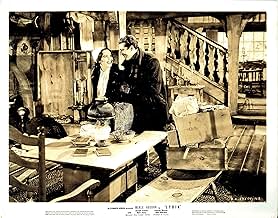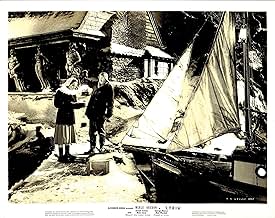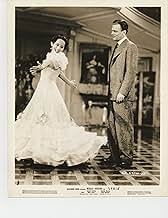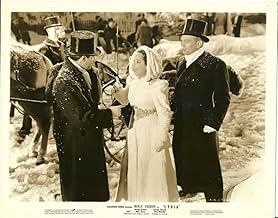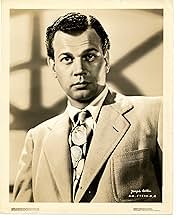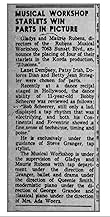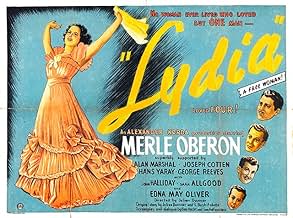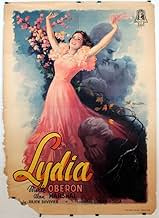Füge eine Handlung in deiner Sprache hinzuAn elderly woman reunites with the three men who loved her in their youth.An elderly woman reunites with the three men who loved her in their youth.An elderly woman reunites with the three men who loved her in their youth.
- Für 1 Oscar nominiert
- 5 Gewinne & 1 Nominierung insgesamt
Hans Jaray
- Frank
- (as Hans Yaray)
Evelyn Beresford
- Sarah's Guest
- (Nicht genannt)
Tyler Brooke
- Vaudeville Singer
- (Nicht genannt)
Frank Conlan
- Old Ned
- (Nicht genannt)
Harry Cording
- Hotel House Detective
- (Nicht genannt)
Hal K. Dawson
- Hotel Desk Clerk
- (Nicht genannt)
Jack Deery
- Ball Guest
- (Nicht genannt)
Paul Everton
- Sarah's Guest
- (Nicht genannt)
Jesse Graves
- Michael's Servant
- (Nicht genannt)
Bobbie Hale
- Bar Patron
- (Nicht genannt)
Gertrude Hoffman
- Mrs. Fairfield
- (Nicht genannt)
Empfohlene Bewertungen
When the film was finally released in Duvivier's native France ,it did not meet critical favor.I personally find little fault with the opinions expressed."Lydia" is a confused cold work.Duvivier's great American movies are not "Great Waltz" or "Lydia" .They were yet to come:"tales of Manhattan" and "Flesh and fantasy" are immensely superior to the aforementioned efforts.
"Lydia" is supposed to be a remake of "Un Carnet de Bal ",Duvivier's indisputable masterpiece.But the two works are worlds apart.I would go as far as to write "Lydia" is to "Carnet de Bal" what "The long night" is to "Le jour se lève" .But Carné's chef d'oeuvre was remade by Anatole Litvak whereas Duvivier redid himself.
Actually "Lydia" reminds me of Duvivier failed film "Untel Père Et Fils " ;it's a hodgepodge : a grumpy granny with a golden heart, a sailor ,the Civil War(?) , a blind pianist ,the sad fate of blind children during the nineteenth century, the good lady whose life is not empty cause she creates a house for these unfortunate kids (a permanent feature of the French cinema of the era : see also "Le Voile Bleu"-remade as "the blue veil" - and "Péchés de Jeunesse").
Nothing is left from the original work,the Madeleine of Proust of the French cinema: and showing Merle Oberon with her three beaus (and the fourth is not far away)does not make up for Marie Bell's spleen,solitude and nostalgia on the banks of the lake.One should also add that the male characters are not really interesting.
Orson Welles was a great Duvivier fan and it's probably the reason why Joseph Cotten is part of the cast.Later,Welles would borrow the female star of "Au Royaume des Cieux" (Suzanne Cloutier) from Duvivier for his "Othello".
The best of this movie is its pictures:the ball is nicely filmed ,although a bit kitsch;the snowy landscapes are enhanced by a refined cinematography.
The sound of my copy is rather lousy. The music ,which is intrusive,often drowns out the actors' voices.
"Lydia" is supposed to be a remake of "Un Carnet de Bal ",Duvivier's indisputable masterpiece.But the two works are worlds apart.I would go as far as to write "Lydia" is to "Carnet de Bal" what "The long night" is to "Le jour se lève" .But Carné's chef d'oeuvre was remade by Anatole Litvak whereas Duvivier redid himself.
Actually "Lydia" reminds me of Duvivier failed film "Untel Père Et Fils " ;it's a hodgepodge : a grumpy granny with a golden heart, a sailor ,the Civil War(?) , a blind pianist ,the sad fate of blind children during the nineteenth century, the good lady whose life is not empty cause she creates a house for these unfortunate kids (a permanent feature of the French cinema of the era : see also "Le Voile Bleu"-remade as "the blue veil" - and "Péchés de Jeunesse").
Nothing is left from the original work,the Madeleine of Proust of the French cinema: and showing Merle Oberon with her three beaus (and the fourth is not far away)does not make up for Marie Bell's spleen,solitude and nostalgia on the banks of the lake.One should also add that the male characters are not really interesting.
Orson Welles was a great Duvivier fan and it's probably the reason why Joseph Cotten is part of the cast.Later,Welles would borrow the female star of "Au Royaume des Cieux" (Suzanne Cloutier) from Duvivier for his "Othello".
The best of this movie is its pictures:the ball is nicely filmed ,although a bit kitsch;the snowy landscapes are enhanced by a refined cinematography.
The sound of my copy is rather lousy. The music ,which is intrusive,often drowns out the actors' voices.
Well, as soon as we see that Joseph Cotten and Edna Oliver are in this, we know it won't be a bad film... it was nominated for best Music in a drama, but The Devil and Daniel Webster won it that year. Lydia (Merle Oberon) and Michael (Cotten) meet up in their later years, and reminisce about the past, which we always seem to remember as better than it was. Edna Oliver is (once again)the overbearing, frumpy grandmother who is very set in her ways, and is determined that Lydia will only be with a proper gentleman.
Lydia and her old beaus talk about "the grand ball" they had attended in their youth, with the harps, mirrors, and chandeliers, which everyone remembers differently. Then, we flash back to the glorious football game, on which they also disagree. We flash forward, then backward, and forward and backward, and its all a lot of work to keep up with where we are now. It's all done competently, but there are no sparks between her and the men from her past, and its a little like reading a history book. It just seems to be a lot of talk about being in love way back when. Then, about halfway through, Lydia meets up with a little boy who changes her life. Then we find out how Lydia got to where she is today. It's entertaining enough, but not one of my favorite films. Produced by Alexander Korda, who happened to be Oberon's hubby at the time.
Lydia and her old beaus talk about "the grand ball" they had attended in their youth, with the harps, mirrors, and chandeliers, which everyone remembers differently. Then, we flash back to the glorious football game, on which they also disagree. We flash forward, then backward, and forward and backward, and its all a lot of work to keep up with where we are now. It's all done competently, but there are no sparks between her and the men from her past, and its a little like reading a history book. It just seems to be a lot of talk about being in love way back when. Then, about halfway through, Lydia meets up with a little boy who changes her life. Then we find out how Lydia got to where she is today. It's entertaining enough, but not one of my favorite films. Produced by Alexander Korda, who happened to be Oberon's hubby at the time.
"Lydia" from 1941 is a remake of Jacques Duvivier's 1937 'Un Carnet De Bal.' It retains the same plot and here is remade by Duvivier himself.
Lydia MacMillan (Merle Oberon) is an old but still vital single woman who is visited by four ex-suitors: Michael (Joseph Cotton), Hans (Frank Andre), and Bob (George Reeves) who reminisce with her about the old days and how much they all loved her and wanted to marry her, and how, one way or another, it just didn't work out.
It turns out that Lydia, from a good Boston family, only had one great love, Richard (Alan Marshal), who, after a few days together (during which I think we are to assume she lost her virginity) takes off in his boat. He leaves her a "Dear Jane" letter, stating that he'll be back after he clears things up with a woman who "has a claim on him." He gives her his grandmother's wedding ring and says he will keep sending her rings until he returns. She hears from him sporadically but she never sees him again.
She can really never let go of her love for him, so she remains single, and devotes herself to her work with blind children, who attend a school she set up.
In 'Un Carnet de Bal," the character is widowed and wonders how her life would have been had she married the other men who were in love with her, the men who danced with her one night that changed her life forever.
The angle of "Lydia" is a little different and probably a little deeper. But it's still a film about nostalgia, youth, and disenchantment.
Edna Mae Oliver plays Lydia's grandmother, and she's wonderful in this, her last film. She died the following year at the age of 59. People probably thought she was 75.
Merle Oberon gives a lovely performance as Lydia, both as a young woman reveling in her beautiful gown, dancing, and being young, and as an older woman reminiscing. She tells each of the men that none of her really loved her because they never knew her; Michael loved "an angel," Hans, the blind composer/pianist she meets loved "the blond, blue eyed girl" described to him by a child whom he asked to describe Lydia and instead, she describes her doll; and Bob loved the young, wild thing that was ready to elope with him. Richard was the only man who truly knew her, and with him, she was herself. Or so she believes.
Duvivier did the best he could with this Americanized version, but it can't live up to 'Un Carnet De Bal' with its French sensibility.
Nevertheless, pleasant and worth seeing. A bittersweet story of a woman looking back on her life. We all do it at some point.
Lydia MacMillan (Merle Oberon) is an old but still vital single woman who is visited by four ex-suitors: Michael (Joseph Cotton), Hans (Frank Andre), and Bob (George Reeves) who reminisce with her about the old days and how much they all loved her and wanted to marry her, and how, one way or another, it just didn't work out.
It turns out that Lydia, from a good Boston family, only had one great love, Richard (Alan Marshal), who, after a few days together (during which I think we are to assume she lost her virginity) takes off in his boat. He leaves her a "Dear Jane" letter, stating that he'll be back after he clears things up with a woman who "has a claim on him." He gives her his grandmother's wedding ring and says he will keep sending her rings until he returns. She hears from him sporadically but she never sees him again.
She can really never let go of her love for him, so she remains single, and devotes herself to her work with blind children, who attend a school she set up.
In 'Un Carnet de Bal," the character is widowed and wonders how her life would have been had she married the other men who were in love with her, the men who danced with her one night that changed her life forever.
The angle of "Lydia" is a little different and probably a little deeper. But it's still a film about nostalgia, youth, and disenchantment.
Edna Mae Oliver plays Lydia's grandmother, and she's wonderful in this, her last film. She died the following year at the age of 59. People probably thought she was 75.
Merle Oberon gives a lovely performance as Lydia, both as a young woman reveling in her beautiful gown, dancing, and being young, and as an older woman reminiscing. She tells each of the men that none of her really loved her because they never knew her; Michael loved "an angel," Hans, the blind composer/pianist she meets loved "the blond, blue eyed girl" described to him by a child whom he asked to describe Lydia and instead, she describes her doll; and Bob loved the young, wild thing that was ready to elope with him. Richard was the only man who truly knew her, and with him, she was herself. Or so she believes.
Duvivier did the best he could with this Americanized version, but it can't live up to 'Un Carnet De Bal' with its French sensibility.
Nevertheless, pleasant and worth seeing. A bittersweet story of a woman looking back on her life. We all do it at some point.
It is almost 20 years ago, I saw this movie at TV.. and it still break my heart now.. Very touching. The ending is so unforgettable.. I could clearly remember the story, and the ENDING.. so sad, Lydia is so lovely.. and she was not the only one who suffer, but also her admirers.. obviously wasting years in reaching out for love!? What is love? Did Lydia sure that she is in love with that guy? She don't even know him.. they just get together for such a short time.. well, it is very romantic.. and that is why I still remember this movie, and want to see that again.. but as I grew older.. it is not romantic to me anymore.. but still she still break my heart, cos I think it is quite hard to find someone who could so insist in love or.. her own belief? What am I talking about?
An unexceptionable pleasure to the primary senses of the eyes and ears. This results from a combination of Oberon's lush eyebrows and the pillowy opulence one imagines from a director with a surname like Duvivier. The film is a 'refashioning' of his French-language 'Un Carnet De Bal' from 1937, in that the basic plot is Oberon's portmanteau recollection of 4 past loves. Cynics may understandably dive for the sick bags, but it's a pleasant surprise therefore to find that for all the typical Fox emphasis on visual scrumptiousness, this romantic opus turns out to be a narratively literate affair. It's lent considerable dramatic weight by an excellent cast, including an uncharacteristically unhistrionic Oberon.
Wusstest du schon
- WissenswertesThe poem Lydia and Bob quote at the ball is "The Night has a Thousand Eyes" by Francis William Bourdillon, a Victorian English poet (1852-1921). The text is "The night has a thousand eyes, / And the day but one; / Yet the light of the bright world dies / With the dying sun. / The mind has a thousand eyes, / And the heart but one: / Yet the light of a whole life dies / When love is done."
- PatzerAt one point, Granny mentions her intention to send Lydia to her cousin Sally's. In the next scene, Lydia refers to her cousin as "Mary".
- VerbindungenFeatured in Ladies in Black (2018)
Top-Auswahl
Melde dich zum Bewerten an und greife auf die Watchlist für personalisierte Empfehlungen zu.
- How long is Lydia?Powered by Alexa
Details
- Laufzeit1 Stunde 28 Minuten
- Farbe
- Seitenverhältnis
- 1.37 : 1
Zu dieser Seite beitragen
Bearbeitung vorschlagen oder fehlenden Inhalt hinzufügen

